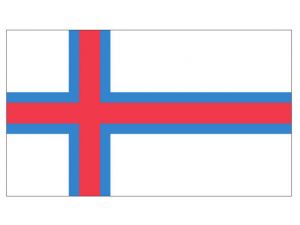Language/Faroese/Grammar/How-to-Use-Be
Hi Faroese learners! 😊
In this lesson, we will focus on how to use "be" in Faroese. "Be" is one of the most important verbs in any language as it allows us to talk about existence, identity, and state. So let's dive in!
Take some time to dive into these other pages after completing this lesson: Negation & Pronouns.
"Be" in Present Tense[edit | edit source]
In Faroese, there are four ways to express "be" in the present tense, depending on whether the subject is singular or plural, and if it is in first, second, or third person. Let's see them in the table below:
| Subject | Verb | Example |
|---|---|---|
| I | er | Eg er (I am) |
| You (singular) | ert | Tú ert (You are) |
| He/She/It | er | Hann/ho/tað er (He/She/It is) |
| We | eru | Vit eru (We are) |
| You (plural) | eruð | Tær eruð (You are) |
| They | eru | Tey eru (They are) |
And here is an example dialogue so you can see these verbs in action:
- Person 1: Hvør ert tú? (Who are you?)
- Person 2: Eg ert Gunnar. (I am Gunnar.)
"Be" in Past Tense[edit | edit source]
In Faroese, the past tense of "be" is "vara". This verb changes its form depending on the subject of the sentence, and it needs an auxiliary verb to form sentences in the past tense, just like in English. Let's see the table with the conjugation of "vara" in the past tense.
| Subject | Form of "vara" | Example |
|---|---|---|
| I | var | Eg var (I was) |
| You (singular) | vart | Tú vart (You were) |
| He/She/It | var | Hann/ho/tað var (He/She/It was) |
| We | vóru | Vit vóru (We were) |
| You (plural) | vóruð | Tær vóruð (You were) |
| They | vóru | Tey vóru (They were) |
Example dialogue:
- Person 1: Hvat gjørdist ígær? (What happened yesterday?)
- Person 2: Eg var í býnum allan dagin. (I was in the town all day.)
"Be" in Future Tense[edit | edit source]
To express "be" in the future tense in Faroese, we use the verb "verða" which means "become". We simply conjugate "verða" in the present tense and combine it with the present participle of the main verb. Here's how it works:
| Subject | Form of "verða" | Present participle of a verb | Example |
|---|---|---|---|
| I | verð | gerandi form of a verb + -i | Eg verði lesandi (I will be reading) |
| You (singular) | verður | gerandi form of a verb + -ur | Tú verður lesandi (You will be reading) |
| He/She/It | verður | gerandi form of a verb + -ur | Hann/ho/tað verður lesandi (He/She/It will be reading) |
| We | verða | gerandi form of a verb + -a | Vit verða lesandi (We will be reading) |
| You (plural) | verðað | gerandi form of a verb + -að | Tær verðað lesandi (You will be reading) |
| They | verða | gerandi form of a verb + -a | Tey verða lesandi (They will be reading) |
Example dialogue:
- Person 1: Hvat verður tú at gera í kvøld? (What will you be doing tonight?)
- Person 2: Eg verði lesandi bókina. (I will be reading the book.)
"Be" in Imperative Mood[edit | edit source]
The imperative mood in Faroese is used to give commands or requests. To express "be" in the imperative mood, we use the verb "vera". Here are the two forms of the imperative mood for "be":
| Subject | Form of "vera" |
|---|---|
| Singular (you) | Ver |
| Plural (you) | Verið |
Example dialogue:
- Person 1: Vitað tú, harður at dúka niður? (Do you know, it's hard to go down?)
- Person 2: Ver frí! (Be free!)
Conclusion[edit | edit source]
Congratulations! Now you know how to use "be" in Faroese in different tenses and moods. To improve your Faroese Grammar, you can also use the Polyglot Club website. Find native speakers and ask them any questions!
Don't forget to check out our other Faroese Grammar lessons on the Faroese language page.
➡ If you have any questions, please ask them in the comments section below.
➡ Feel free to edit this wiki page if you think it can be improved. 😎
With this lesson finished, you may want to explore these additional pages: Plurals & Adjectives.
Other Lessons[edit | edit source]
- Conditional Mood
- Plurals
- Adjectives
- Negation
- How to Use Have
- Questions
- Give your Opinion
- Future Tense
- Pronouns

